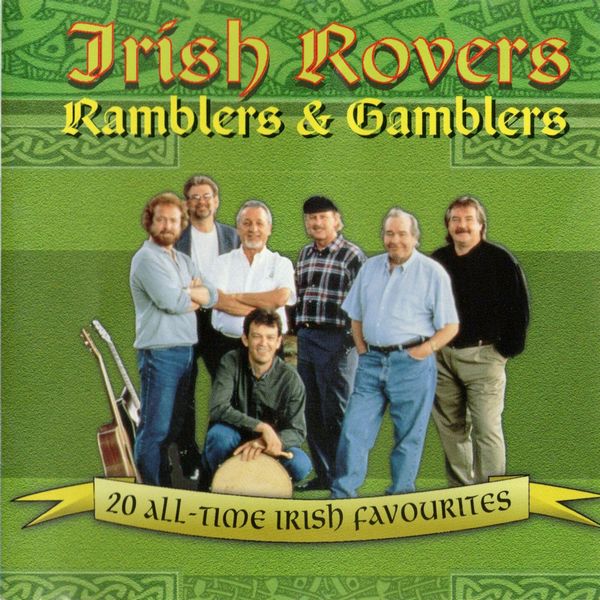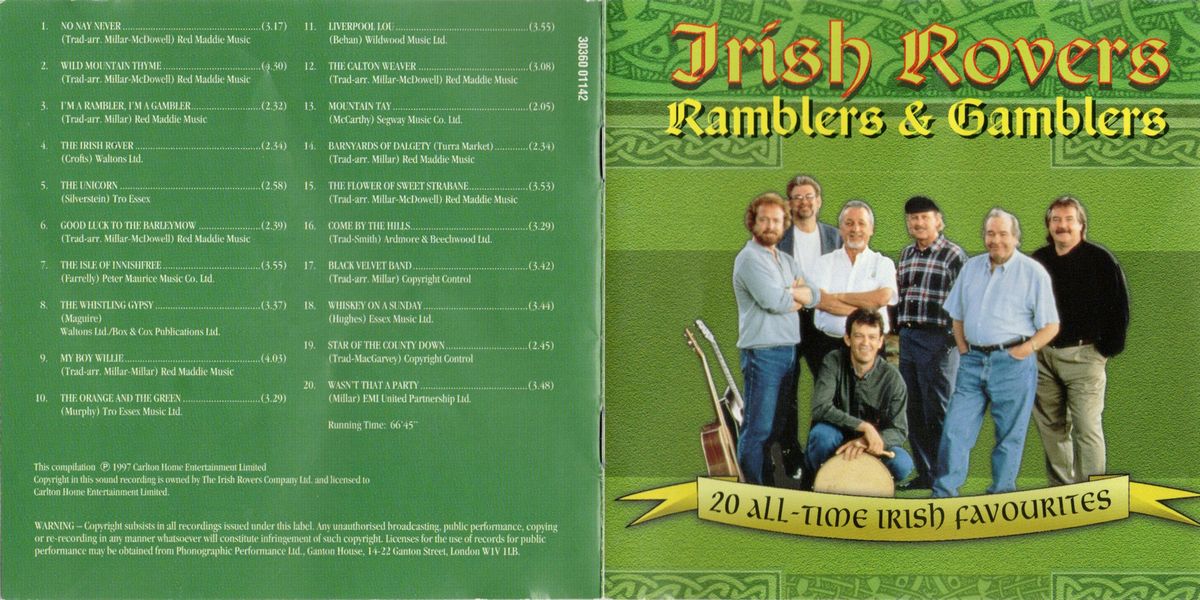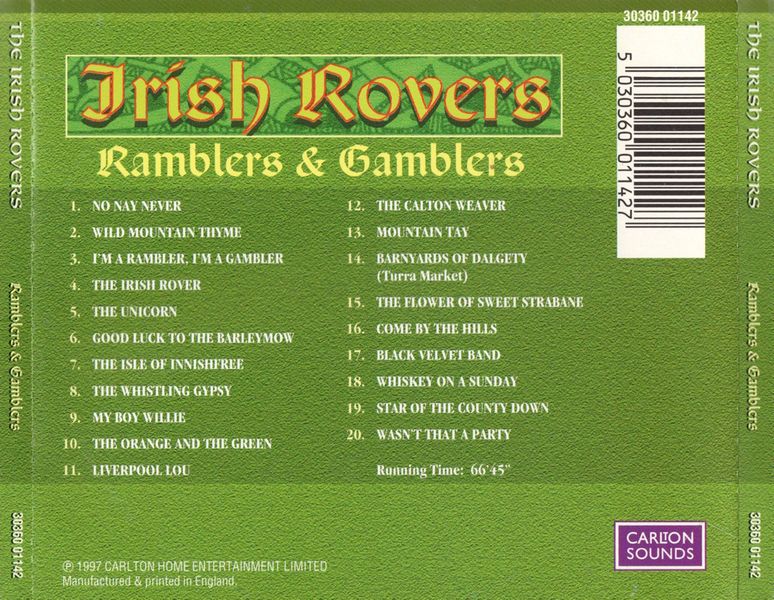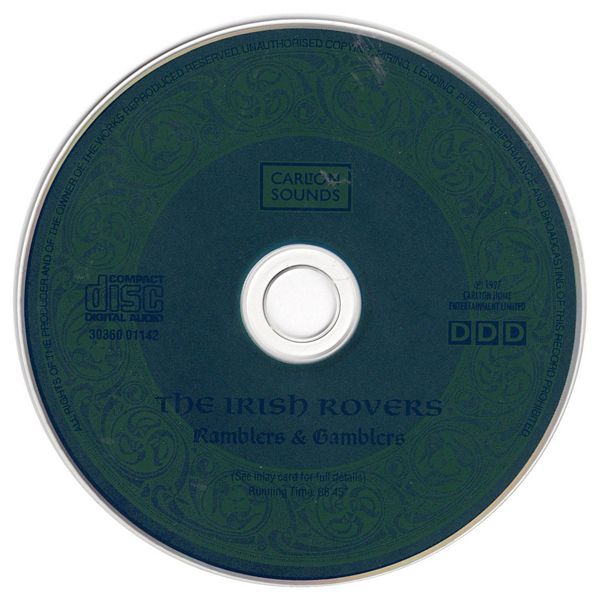
 |



|
| more images |
Sleeve Notes
Unlikely as it may seem, when he was a young man, the recently departed British Prime Minister, John Major, was given the nickname of Rover by an early girl friend, due to his habit of always being on the move (or something like that). Rover is also a popular, if perhaps hackneyed, name for dogs, but The Irish Rovers, as featured here, are neither canine nor political, but are in fact, a long-established (30 years!) group of musicians, mostly immigrants from Ireland, who play popular Celtic tunes which are familiar to the numerous people of Celtic origin who live in Canada. The generally accepted reason for the proliferation of Celts outside Europe is that the Celtic races have a history of travelling — roving, often in search of work, which has traditionally been limited, particularly in Ireland. The New World, as North America was known, certainly seemed to many Irish people a place where they could build a new life, and there is undoubtedly a considerable Irish community in North America — President John F. Kennedy, for example, was proud of his Irish ancestry.
The original founders of The Irish Rovers, George Millar (guitar, vocals) and Jimmy Ferguson (lead vocals) emigrated with their families to Toronto in Canada as teenagers in the early Sixties, and after discovering at a party that they could harmonise vocally to good effect, decided to form a group — George's mother, Elsie Millar, suggested the name of The Irish Rovers, and George & Jimmy operated as a duo for a few months until they recruited George's cousin, Joe Millar (bass, vocals), and after moving to Calgary, George's brother, Will (vocals). This was in 1964, and during the mid-Sixties, the group decided to investigate San Francisco, where by all accounts, a musical revolution was starting. Soon finding work performing at a local restaurant, the group made a considerable impression, although not for their psychedelic music, but rather for their ability to entertain — songs, jokes, and no doubt a touch of the Blarney Stone.
This initial introduction to a completely new audience was such a success that the group, by then a quintet of George, Joe & Will Millar, Jimmy Ferguson and new recruit Wilcil McDowell (accordion, keyboards, previously leader of a successful ceilidh band in Ireland, and winner of an All-Ireland accordion championship), were offered a residency at a notable San Francisco folk club, The Purple Onion, where they headlined for almost six months. This led to a recording contract with American Decca Records (now MCA), and the release of a US Top 10 single in 1968, The Unicorn', which remained in the Billboard' chart for three months. This song, which was written by Shel Silverstein (who was also responsible for writing such famous songs as 'Sylvia's Mother' for Dr.Hook and A Boy Named Sue' for Johnny Cash, among many more wonderful songs), became the signature tune of The Irish Rovers, and over the years, has sold well over a million copies. Later in 1968, the group's next US hit single was The Puppet Song (Whiskey On A Sunday)', which is also included here.
On their return to Canada in the early Seventies, the group starred in a weekly TV variety show, which ran for six series on CBC, the local equivalent to Britain's BBC, and won an award for Best Variety Performance. Not just for their music, entertaining though it undoubtedly was, but also for the hugely popular comedy sketches in which Will, George & Jimmy played the parts of a trio of recalcitrant leprechauns with attitude. This series is by all accounts still screened around the world and is regarded as a classic, timeless example of the TV variety genre. Later, at the start of the 1980s, the group returned to the recording studio, this time to be produced by Jack Richardson, a Canadian who had been highly successful as producer for Alice Cooper, Poco and The Guess Who, among many others. Their liaison resulted in a return to the US singles chart for The Rovers (as they were known at the time) after an absence of well over a decade, with their version of Tom Paxton's 'Wasn't That A Party', which was a US Top 40 hit in 1981 .The recordings here are virtually a 'Best Of, recorded in 1996 as a catalogue of the group's most popular and enduring songs from the previous 30 years. The line-up of musicians has now increased to seven — originals George Millar and Jim Ferguson are still there, as are Joe Millar and Wilcil McDowell, while drummer/bodhran player Kevin McKeown has been a group member since the mid-1980s. The more recent recruits featured here are Belfast-born guitarist/vocalist John Reynolds, and multi-instrumentalist Wallace Hood.
George Millar, who produced this album, explained how it came about: "One evening last spring (1996), we sat down together to listen to our old albums with the purpose of releasing 12 tracks for a 'Best Of disk of our hard to find songs. After a laugh or two over the 'Donald Duck' tone of our young voices, we realised that there were some great songs that we had forgotten all about. The more we listened to the old versions, the more new ideas for arrangements and instrumentation emerged. The real problem was about to start — how to get a group of Irishmen to agree to anything, never mind selecting 12 songs out of approximately 300. After a few 'civil' discussions and not so few Guinnesses, we managed to pick 32 of our favourites, at which point everyone refused to participate in the elimination of any more songs, out of love and respect for the material and the fact that the Guinness had now gone. Well, to end this artistic and cultural evening, we not only decided on 32 tracks, we also decided to re-record them". This collection features the cream (20 tracks) of that 32, and includes such familiar songs as 'The Wild Rover', 'Wild Mountain Thyme', 'Liverpool Lou', Black Velvet Band' and 'Star Of The County Down', us well as hits like 'Whiskey On A Sunday', 'Wasn't That A Party' and (of course) The Unicorn'.
Although The Irish Rovers were not as commercially successful in the UK as they were in the US, their longevity and the quality of their performances would seem to put them in a similar category to that enjoyed by The Chieftains. All the correct authentic instrumentation — whistle, accordion, bouzouki, cittern, banjo, mandolin, etc. — and many songs which are well-known to the Irish community. Of course, you don't have to he Irish (or any other sort of Celt) to enjoy these masters of their chosen art performing new versions of their past classics.
Seán Charles Paul, Kerry, 1997.